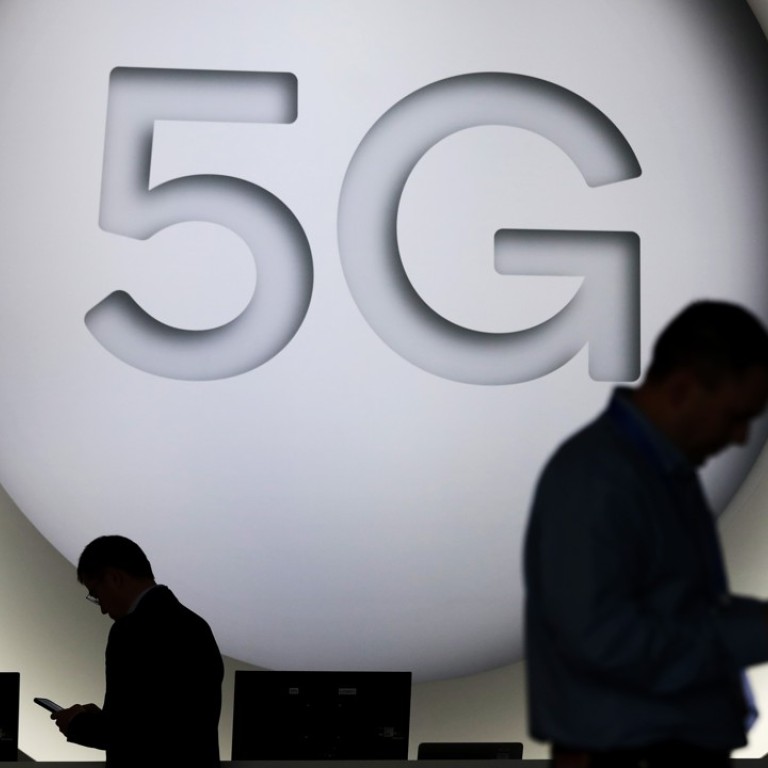
China moves ahead with 5G mobile development plans despite Huawei’s legal woes
- China Mobile, China Unicom and China Telecom have been granted 5G radio frequency spectrum allocations to pursue trials in the next-generation mobile system ahead of its wide roll-out from 2020
China is moving rapidly to develop 5G services nationwide after allocating radio frequency spectrum for the next-generation mobile system to the country’s three telecommunications carriers, despite concerns over the legal battle being waged by network equipment giant Huawei Technologies in Canada.
The central government awarded China Mobile, China Unicom and China Telecom with 5G spectrum licences on Friday, enabling them to conduct final trials for the new mobile system before its wide commercial roll-out from 2020.
“This sends a clear signal to the industry that we aim to promote the maturity and development of China’s 5G industry,” the Ministry of Industry and Information Technology (MIIT) said in a statement posted on its website on Monday.
The MIIT said the trials would ensure the compatibility of the various types of radio frequency spectrum ahead of the launch of 5G mobile services.
Unicom and China Telecom were allocated 100 megahertz each of spectrum in the 3.5-gigahertz to 3.6GHz bands and 3.4GHz to 3.5GHz bands, respectively, for their trial 5G networks, according to separate filings to the Hong Kong stock exchange on Friday.
China Mobile, the world’s largest wireless network operator by subscribers, said in its regulatory filing that it was allocated 160MHz of spectrum at 2.6GHz for its 5G trial.
“While the reports indicate these are ‘testing’ and not ‘commercial’ licences, we believe the test spectrum is likely to be the same as the final commercial allocation,” Bernstein Research senior analyst Chris Lane said in a report.
The award of 5G spectrum resources has come amid the legal troubles of Shenzhen-based Huawei, the world’s largest telecoms equipment supplier and a major driving force in China’s bid to lead the world in advanced communications systems.
That ambition has been put at risk after the arrest of Huawei chief financial officer Sabrina Meng Wanzhou, the daughter of company founder Ren Zhengfei, in Vancouver on December 1 at the request of US authorities. Meng faces US fraud charges associated with sanctions-skirting business dealings with Iran, according to media reports.
At Meng’s bail hearing in the British Columbia Supreme Court on Friday, the US sought to extradite the Huawei CFO in relation to the company’s alleged use of an unofficial subsidiary, Skycom, to get around US and EU sanctions against Iran, according to a lawyer representing the Canadian government.
While Meng’s extradition case could go on for months, there is speculation that Washington is looking to impose a US export ban on Huawei.
“If that happens, it will be a serious setback to China’s 5G timeline, and it will also significantly weaken China’s bargaining position in the trade negotiations [with the US],” Jefferies equity analyst Edison Lee said in a report.
“China will unlikely want to build 5G without Huawei,” he said. “To get Huawei out of such an export ban, the US is likely to ask for concessions in China’s tech subsidy and Buy China policy in various industries, including telecoms.”
The US had slapped an export ban on ZTE Corp, China’s second largest telecoms equipment manufacturer, earlier this year for making false statements about disciplining executives involved in violating US trade sanctions on Iran and North Korea. That forced the Hong Kong-listed company to shut down its major operations. The ban was lifted after ZTE reached a settlement with US authorities.
Lee said a US export ban against Huawei, which has US$92 billion in annual revenue, could cut the scale of China’s telecoms supply chain if the privately held firm lost substantial business outside China. Such a ban would block access to American technology suppliers and limit the number of markets where the company can sell its products.
Although Huawei and ZTE are spearheading China’s bid to become the leading supplier of advanced telecoms equipment to the world’s mobile carriers, the two companies and their respective ecosystems of hi-tech suppliers remain dependent on a range of US-developed technologies, including software and semiconductors.
China will unlikely want to build 5G without Huawei
A potential ban “could raise the cost of China’s efforts to build 5G”, according to Lee.
Despite that threat, Huawei has continued to push forward its 5G initiatives and has signed 22 commercial contracts overseas to date. Huawei recently announced a memorandum of understanding with Altice Portugal, one of 15 carriers in Europe that look to use the firm’s 5G equipment.

